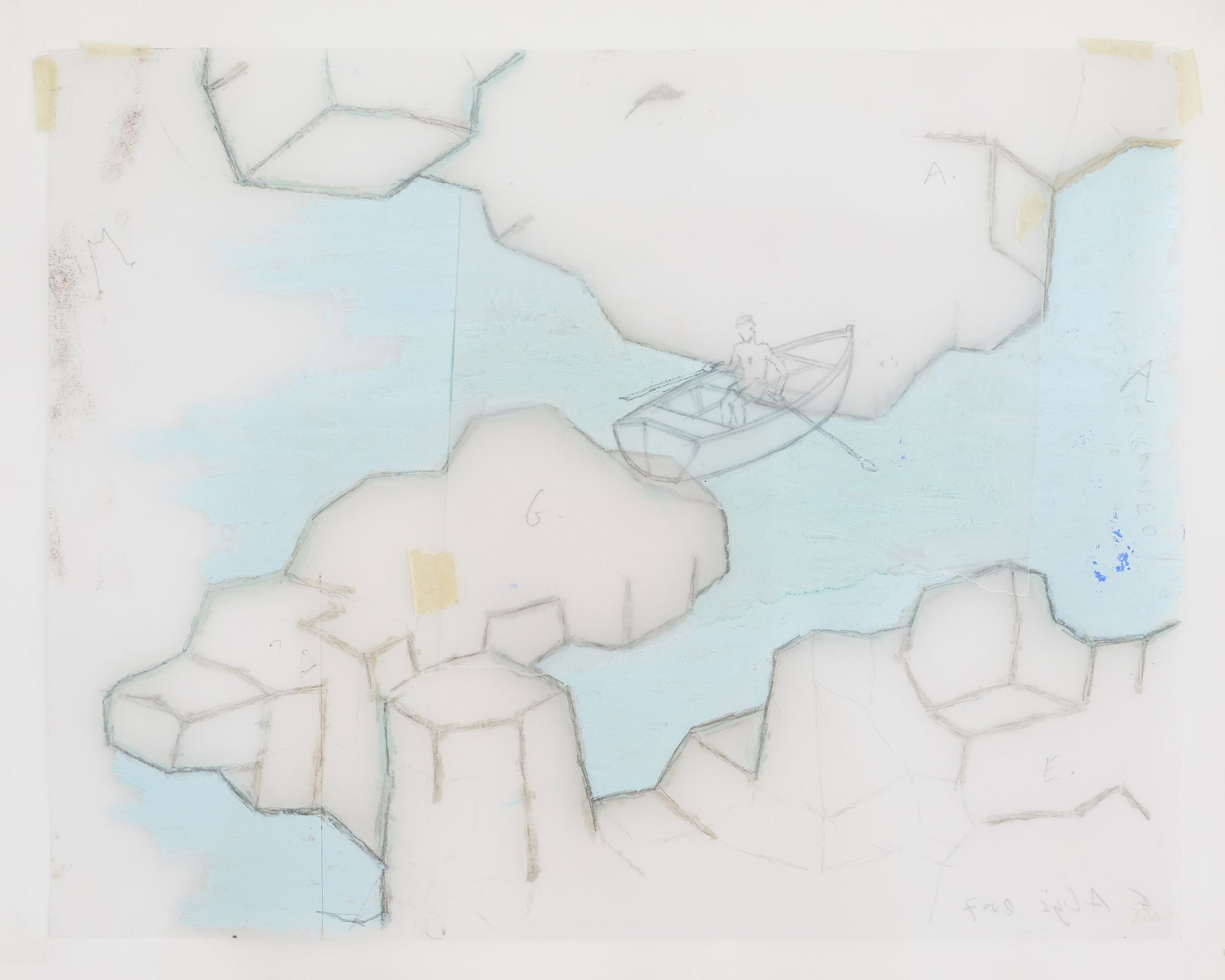Seas, Lands and Bodies Crossed
28 April–21 May 2023, Marseille
A proposal by Cécile Bourne-Farrell
Francis Alÿs, Untitled, 2007
Graphite, acrylic and collage on vellum paper, 27.9 × 35.6 cm
Private Collection, France
Each in their own way, the works of the six artists scrupulously chosen for La Traverse, evoke the question of the displacement of people and goods following conflicts but also the ecological disasters suffered by the populations. These artists offer a unique, generous and critical view of the consequences of unbridled capitalism and climate change. From sugar cane to potatoes, from the construction of dams to the relentless exploitation of land and people, many people also migrate to better places.
In her photographic compositions, Malala Andrialavidrazana develops a rich imagination, based on illustrations taken from banknotes that refer to colonial exploitation. Otobong Nkanga, highlights references to the environment endangered by the despoiling of land and the extraction of indigenous people. Jean-Paul Thibeau proposes to create other relationships between art and life, in order to explore a more relevant existence that is more attentive to human relations. The potato is a commodity from which rich narratives and unexpected experiences can intersect and connect; it functions as a common medium. Shivanjani Lal constructs temporary landscapes that she sees as shifting sites of diasporic healing, places of transition at the heart of her artistic practice. Tuli Mekondjo pays homage to her grandmother who, like many Awaambo women, was sterilised, eliminated or displaced in Namibia. Louisa Marajo crosses seas and lands in search of different temporalities that revive by superimposition the toxic flames of our buried waste. Finally, Francis Alÿs, in his collages, highlights the proximity of two continents separated by only 13km of sea that carries migrants in its waters on makeshift boats.
According to the Migration Portal, by the end of 2022, approximately 5.9 million people in 84 countries and territories are living in displacement as a result of disasters that occurred not only in 2020, but also in previous years (IDMC, 2021)(https://www.migrationdataportal.org/fr/themes/migration-environnementale). The majority of mobility in the context of environmental and climate change, including disaster-induced displacement, occurs within country borders and forces people to migrate. The intensification of climatic phenomena and the oppression of people over each other lead to the displacement of people which drastically changes the trajectories of lives from Sudan to Ukraine.
This project Seas, Lands and Bodies Crossed will take place under the sign of performance and the unique presentation of works deployed in this space of all imaginable potential interactions.
— Cécile Bourne-Farrell
OtobongNkanga, Uprooting The Past, 2006
Tryptich, Study colour print on paper, framed, 24.2 × 24.2 cm (×3)
Private collection, London
Malala Andrialavidrazana, RollingFigures 1.0, 2022
Single print hand, coloured with pigment ink, 420 × 100 cm
Courtesy of the artist
Shivanjani Lal, I am Remembering, 2021
Brown paper (from Marine Lines, Bombay), ornate kite thread (from Byculla, Bombay), haldi (turmeric) and chuna powder (from Deptford, London), 45 × 30 cm
Courtesy of the artist
Shivanjani Lal, 4 Lines Across a Horizon – Ba, 2021
Print on cotton cloth, colour photograph (printed by Marine Lines Bombay) red kite thread (from Byculla, Bombay), 33 × 48 cm
Courtesy of the artist
Shivanjani Lal, Paal, 2001
Sugarbags (from Sigatoka Town Fiji), green kite string (from Bycully, Bombay), 98 × 108 cm
Courtesy of the artist
Jean-Paul Thibeau, Méta-radeau de la Traverse, 2023
Variable size and materials
Courtesy of the artist
Tuli Mekondjo, Meekulu tu tula omwenyo / Grandmother revive us, 2021
Image transfer, gold marker on canvas, cotton embroidery thread, crochet thread, silk fabrics, 96 × 95 cm
Private collection, London
Louisa Marajo, J’ai traversé la mer, 2022
Video on loop
Courtesy of the artist
Louisa Marajo, Chaos, Souffle, 2021
Mixed media on hahnemühle paper, 70 × 50 cm
Courtesy of the artist


































